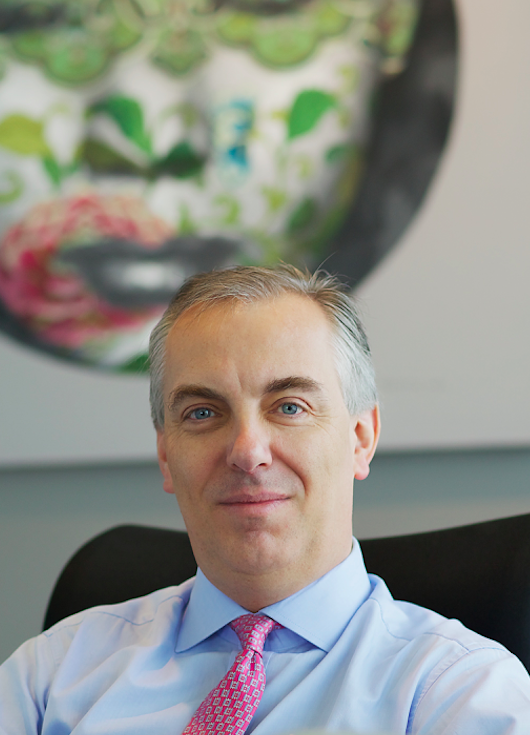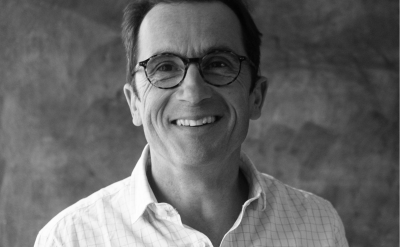News

Pierre-Eric Cohade, SK 1984, CEO of Triangle Tyre Co., Ltd (China)
After a brilliant career on several continents, including at Kodak and Goodyear, Pierre-Eric Cohade became one of a very small number of Western CEOs to head a Chinese company − Triangle Tyre. Today he sits on several boards of directors (Deutsche Bank, Acorn and Ceat). As he reviews the highlights of his career, it is obvious that he is a strong advocate of expatriation and considers it an unrivalled source of both personal and professional enrichment.
Pierre-Eric Cohade divides his time between the United States, Asia – he lives in Shanghai – and Europe. He possesses an exceptional knowledge of the business world in China and loves to share his experience and guide senior executives, including those that sit on the 3 “strategically chosen” boards of directors he has joined over the last few years: first Deutsche Bank, “a remarkable institution and it’s fascinating because at the moment a complete reform of the financial and banking system is under way in China”. Then Acorn, an American direct marketing company listed on the NYSE (New York Stock Exchange): “Digitalisation and e-commerce are the other hot topic in China.” The 3rd board of directors is in India, a country he knows well. It is that of a company called CEAT, which is listed on the Mumbai Stock Exchange and is one of the Indian leaders of the tyre market. “These activities enable me to be in fields that interest me, are undergoing reforms or are in locations that are important to me”. He is also an advisor of the Mayor of Shanghai and chairman of the IMA network for China.
Curiosity and a taste for challenges
And yet nothing predisposed Pierre-Eric Cohade to such a brilliant career outside of France: “Until I joined SKEMA in Sophia Antipolis, my vision was very much limited to France. In 1982 I had the good fortune of heading to Tokyo for a 4-month internship at Marubeni. That was a turning point that changed my life. I understood that holding an MBA was the key to making a career abroad. The school had a particularly worthwhile exchange agreement with Penn State University. After that I had just one goal in mind: being selected to go. My internship report had attracted some attention. What’s more, I was president of the Junior Enterprise and active involvement in the school’s community life is valued. I was selected. After graduating from SKEMA in 1984, I earned my MBA in 1985 in the United States and, well let’s say, I never returned from overseas (laughs).”
Beginnings in finance
As a young graduate, Pierre-Eric Cohade began his career at Kodak. “It was a giant both in terms of its market capitalisation and its turnover; and more importantly it was a global group, which is what attracted me.” They were mass consumption products combined with highly advanced technology: analogue. I had applied to work in marketing and strategy, but I started in finance! Financial planning is basically pretty similar to strategic planning. I was very good at modelling, so I was able to adapt. This gave me a very good grounding. The plant expansion studies, investment studies, cost reduction studies gave me an understanding of the industrial side that I have never forgotten.”
After 3 years, in 1988, the young man was offered a position in Brazil as a Corporate Financial Analyst. “At the time, this country was in the grips of hyperinflation, so it wasn’t attractive at all. Brazil fascinated me and I really enjoyed moving from the industrial sphere to financial planning for a subsidiary. I was quite quickly promoted to the role of “Controller”, in charge of accounting, reporting… In this context of hyperinflation we had to close off the balance sheet and the profit and loss statement daily.”
Pierre-Eric Cohade then took over as head of the financial division in Mexico in 1991: “The North American Free Trade Agreement (NAFTA) was signed a few months after I arrived. Kodak had 5 standalone companies, which had to be merged into a single company from a financial and administrative perspective, and this company had to be integrated into the American supply chain. It was fascinating. A lot of growth, a lot of investment, cultural difficulties…” These successful expatriations for Kodak in Brazil and Mexico allowed him to rapidly move up the career ladder.
“Do what you are passionate about”
In 1994, he had an important career choice to make. “I was asked to become Chief Financial and Administrative Office for Asia, based in Tokyo, a city which I loved. It was a wonderful promotion in terms of remuneration and visibility. But I wanted to take on business responsibilities. Had I gone to Japan, I would have had far fewer opportunities to shift over to business.” The position of General Manager Brazil became available: “The country was still in a very deep crisis. I knew it was going to be hard, but I put my hand up. It took a good while for this decision to be understood. Three months later, the Cardoso government implemented the Real Plan (Plano Real) and Brazil’s economy was stabilised. That man is a financial genius! Consumption skyrocketed and we were able to reform companies, create a new mode of distribution… Brazil became one of the countries where Kodak was the most profitable and where its growth was the strongest.”
After a stint at the company’s corporate headquarters where he became VP for a line of products worldwide, Pierre-Eric Cohade assumed leadership of the Asia region, in Singapore in 1999. In his own words: “I really wanted to do business. In the end, I had made the right choice! That is my first piece of advice: do something that you are passionate about and every morning you’ll wake up wanting to work!”
Don’t overlook the cultural aspects
Pierre-Eric Cohade then took over responsibility for Europe, at the time when Kodak was changing from a country structure to an agent structure. He steered this project until its conclusion. “We wanted to return to France, to give our children French roots. I was approached by Danone, which wanted to develop a structure and was looking to implement an Anglo-Saxon style of management. I had experience in American companies and I was given a business unit to run – waters and beverages – worldwide. It was a dream job just when I wanted it and the headhunter convinced me. This was an exciting project, but within Danone not everyone was open to managing change. There was a profound cultural mismatch and I left after 18 months. This aspect should not be underestimated; I’d neglected to perform cultural due diligence. That was an error on my part.”
And yet he had no regrets, because very quickly Pierre-Eric Cohade joined Goodyear as Chairman for Asia-Pacific and head of global purchasing: “A superb brand with remarkable technology and industrial capacities, but Goodyear had made a lot of mistakes. They needed to restructure themselves and invest.” The highly autonomous region under his responsibility included mature markets like Japan or Australia, countries experiencing strong growth, such as India and China, but also high-potential product lines in the fields of aviation and civil engineering, for example. “We started with a clean slate and it was exciting: we had to recruit teams, build the brand, the organisation and its culture, create a distribution network from scratch and come up with a product line that suited the market. One of the challenges was to create tyres that stood apart in the eyes of the general public, in order to better market them. We were developing innovations such as puncture-resistant kevlar tyres that met the needs of consumers.” Goodyear really took off in Asia – particularly in China.
CEO of a Chinese national champion
Triangle Tyre is a private company selected by the government for its potential. It receives favourable support from the government to accelerate its national and even its international development. “We had to create a strategy for international expansion and modernise the company’s governance. From the start, I took care of my relations with the Chinese governments. I always considered it a partner. I had welcomed a communist party cell into Goodyear – there again I worked to align the interests of the government and those of my company.”
After 18 months he successfully floated the company on the Shanghai stock exchange. “I then ended my responsibilities at Triangle. It can be dangerous for a foreign CEO to be at the head of a Chinese company, because there is public pressure. I was convinced that I needed to be replaced by a Chinese national. I became advisor to the chairman and retreated somewhat.”
The return of geopolitics
This connoisseur of the Chinese world has noted, over the last 3 or 4 years, “a very clear return of geopolitics. We thought a few years ago that democracy, rule of law and the market economy had eliminated geopolitics. It was the Washington Consensus. But China promotes a market economy that is revised and corrected by a strong role played by the State.” This particularity is well known in France, where the State has always been very present. “French people arriving in China immediately understand the way China works: one must never stray from the interests of the prince nor of the networks (and in China, that’s the Communist Party). It is crucial to understand the role of the State and the geopolitical dynamics when one takes on an executive management role. And actually I have always chosen country general managers with political science acumen in addition to their knowledge of the industry and market.”
Does this globetrotter miss France? On a personal level, the family was able to adapt to the emotional rollercoaster that is expatriation. Highly curious about other cultures and perfectly integrated, his ex-wife, Agnès Cohade David (who also graduated from SKEMA in 1984) opened a contemporary art gallery in Shanghai in 1986, called Art + Shanghai (link: https://www.artsy.net/art-plus-shanghai-gallery). Their children, Arnaud and Alexia, have dual Franco-Brazilian and Franco-Mexican nationality. Having spent all of their summers in American summer camps even though they grew up abroad, they have chosen to settle in the United States.
“I would be happy to gradually reintegrate France,” says Pierre-Eric Cohade. Convinced that expatriation is a wonderful opportunity, he recommends everyone experience it: “It’s a source of personal enrichment for one’s family and for oneself. It has profoundly changed lives around me. And it’s a source of professional enrichment, providing greater autonomy and responsibilities.”
Interview by Marie-Pierre Parlange (www.lepetitjournal.com)




